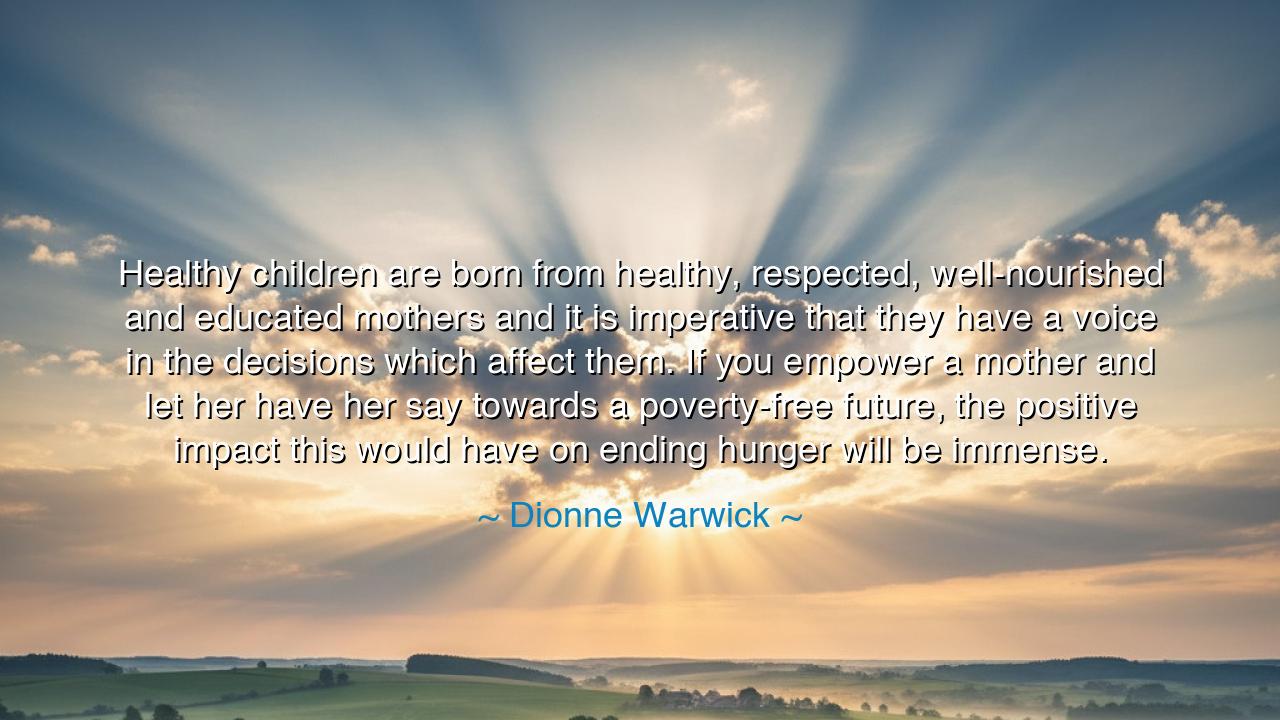
Healthy children are born from healthy, respected
Healthy children are born from healthy, respected, well-nourished and educated mothers and it is imperative that they have a voice in the decisions which affect them. If you empower a mother and let her have her say towards a poverty-free future, the positive impact this would have on ending hunger will be immense.






The words of Dionne Warwick, “Healthy children are born from healthy, respected, well-nourished and educated mothers, and it is imperative that they have a voice in the decisions which affect them. If you empower a mother and let her have her say towards a poverty-free future, the positive impact this would have on ending hunger will be immense,” resound with both tenderness and power. They remind us that the strength of tomorrow is woven into the well-being of today’s mothers, for it is through them that life itself enters the world.
The origin of this truth is as old as humanity. In every civilization, the condition of mothers determined the fate of nations. Where mothers were neglected, children grew weak, and societies faltered. Where mothers were respected and provided with food, education, and dignity, generations rose strong, wise, and prepared. Warwick places into modern words an eternal principle: the destiny of a people lies not in its wealth or armies, but in the care it gives to its mothers.
Consider the story of Grameen Bank in Bangladesh, founded by Muhammad Yunus. By lending small sums to poor women, especially mothers, the bank transformed villages. These women, once silenced by poverty, became pillars of their households, ensuring food for their children, education for their daughters, and health for their families. The positive impact spread far beyond the individual—it lifted entire communities. Here is proof of Warwick’s words: to empower a mother is to strike at the roots of hunger and despair.
Her call is also a warning against blindness. Too often have leaders spoken of progress while silencing the very women who hold the key to it. Without a mother’s voice, decisions fail, for they ignore the wisdom of those who know hunger most intimately, who know the cost of poverty in the empty hands of a child. To silence women is to cripple the future; to uplift them is to heal it.
The meaning of Warwick’s words is therefore both practical and spiritual. Healthy children come not by chance, but by justice: when mothers are given food for the body, knowledge for the mind, and dignity for the spirit. When women are honored as the foundation of families, the walls of poverty begin to crumble, and the dream of a poverty-free future moves closer to reality.
Let the generations remember this teaching: to end hunger, look first to the mothers. Empower them, nourish them, educate them, and above all, respect them. For in their strength lies the promise of nations, and in their voices lies the song of a brighter world.






SLsen lethi
Dionne Warwick’s insight into the connection between mothers' empowerment and ending hunger is eye-opening. If mothers are better nourished and more educated, their children are more likely to thrive. But, how can we practically ensure this in low-income countries or communities? How do we break down the systemic barriers that prevent mothers from fully participating in decisions that affect their children’s futures, especially when poverty is deeply entrenched?
HVThinh Hoang Van
This quote beautifully illustrates the critical role mothers play in shaping the future of their children and, by extension, society. Empowering mothers with education, respect, and a voice in decisions can lead to profound changes. But, is it enough to only empower mothers? What about the broader context, such as the need for equal opportunities, access to healthcare, and economic support for families to thrive? How do we address these other factors?
KCNguyen Tran Khanh Chi
I strongly agree with the idea that healthy and educated mothers have a direct impact on the well-being of their children and society. If we focus on empowering mothers, we can break cycles of poverty that span generations. However, I wonder how we can address cultural or structural barriers that prevent women from being truly heard in decision-making processes, especially in regions where gender inequality still exists.
TTTran Thi Tha
Dionne Warwick's quote emphasizes the importance of empowering mothers as key players in breaking the cycle of poverty and hunger. It’s a powerful perspective, highlighting the interconnectedness of health, education, and respect in a mother’s life. But, how do we ensure that mothers have a voice in the decisions affecting them, especially in communities where their rights are often overlooked? What are the first steps in amplifying their influence on social policies?